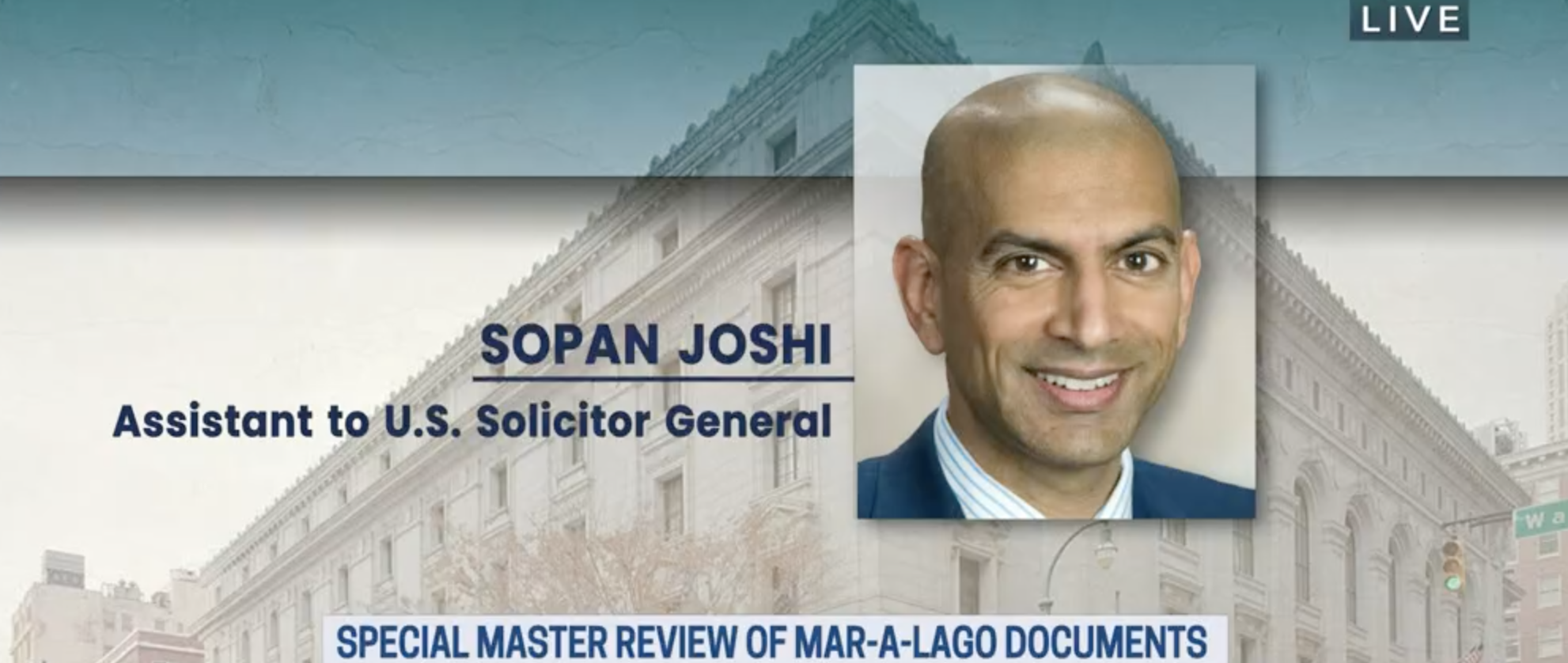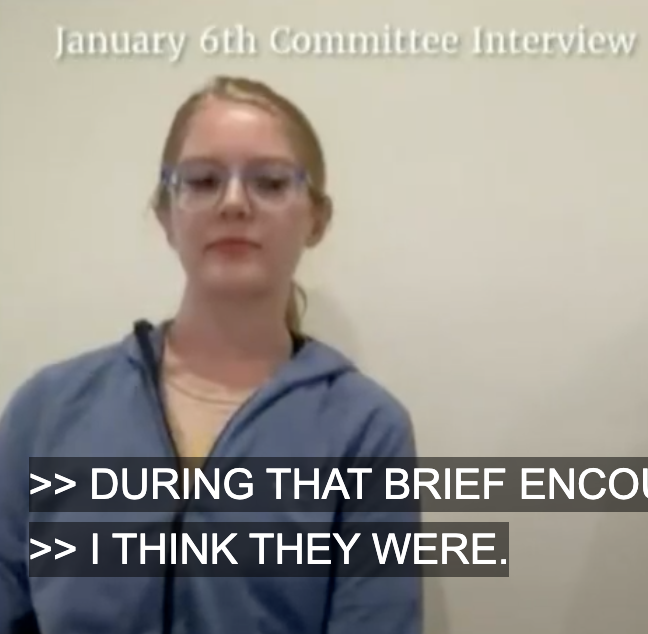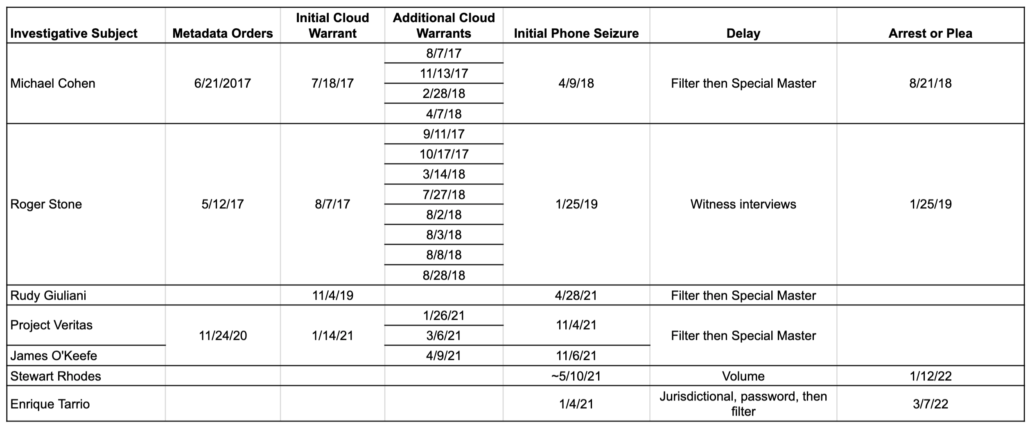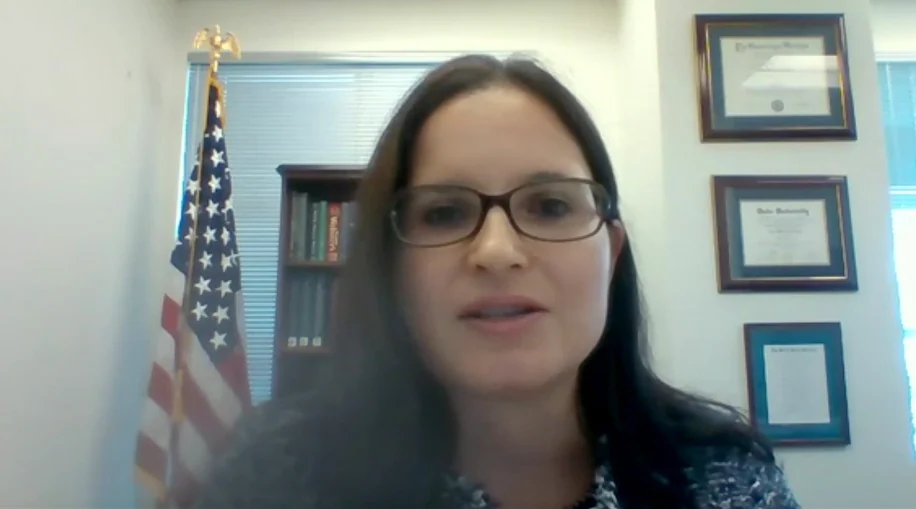My impression of DOJ’s reply brief in their 11th Circuit appeal of Judge Aileen Cannon’s decision to appoint a Special Master to review the files seized from Mar-a-Lago is that they’ve gotten whatever benefit they could get from the Special Master review and now that the election pause has passed, they’re really impatient for the injunction on their investigation to be lifted so they can interview the last few witnesses. That probably includes Trump assistant Molly Michael.
The reply repeats the arguments DOJ made in their opening brief: Judge Cannon abused her authority by getting involved in a case where there was no evidence of callous disregard for Trump’s rights.
But even before that, it calls out Trump for totally changing his tack, no longer arguing that some privilege merits withholding documents from the government, but instead the Tom Fitton theory that Trump could simply convert Presidential Records into his own property by packing it in a box and shipping it to Mar-a-Lago. Since this is a new argument, it’s not proper.
None of those three filings cited Judicial Watch v. National Archives and Records Administration, 845 F. Supp. 2d 288 (D.D.C. 2012), upon which Plaintiff now relies (incorrectly) in claiming authority to convert Presidential records into “personal” records by removing them from the White House. And nowhere in those filings did Plaintiff suggest that he had exercised that purported authority with regard to the seized records—much less why that would warrant an injunction and special-master review. Rather, Plaintiff asserted that the case “center[s] around [Plaintiff’s] possession . . . of his own Presidential records,” DE.58:2 (emphasis added); see also DE.127:8 (transcript) (“What we are talking about here, in the main, are Presidential records in the hands of the 45th President of the United States.”); DE.127:9 (similar). Unsurprisingly, the district court did not rely on this novel PRA theory in issuing its injunction and appointing a special master.1 Because this argument has been “raised for the first time on appeal,” In re Dukes, 909 F.3d at 1322, it need not be considered here.
Importantly, even if the Fitton theory were true, it’d be irrelevant. DOJ had a warrant to obtain these records. Warrants authorize the seizure of personal records all the time. If Trump is lucky, DOJ suggests, he might be able to get some of these records back after DOJ closes the investigation.
Even if Plaintiff could have designated the seized records as “personal” records, that would provide no basis for an injunction or special-master review. A document’s categorization as a “personal” record does not preclude the government from obtaining it through a search warrant or using it in a criminal investigation. Law enforcement officials routinely conduct judicially authorized searches to seize evidence of crimes, see Fed. R. Crim. P. 41(c)(1), and that evidence routinely consists of personal effects, including personal papers. Nothing in the law prohibits the government from using documents recovered in a search if they are “personal,” and the search warrant here authorized the government to seize materials stored collectively with records bearing classification markings regardless of their status as “personal” or Presidential records.
[snip]
Simply put, the government can review and use materials obtained in its judicially authorized search regardless of whether they are Presidential or “personal” records. At most, a record’s categorization under the PRA speaks to whether that record would be provided to NARA or returned to Plaintiff after the government’s investigation concludes.
DOJ also talks about all the ways that the Special Master process has already mooted any legitimate demand Trump might have had. DOJ returned to Trump any legitimately privileged documents, as they tried to do before Judge Cannon prevented them from doing so as to create a harm she needed to fix.
The government’s filter team has also now returned to Plaintiff a limited set of documents segregated by the filter team—as it sought to do at the very outset, see U.S. Br. 25—thus mooting any hypothetical disputes about attorney-client privilege as to those documents. See DE.138:2.
He has copies of all the non-classified documents, which would be the outcome of any successful Rule 41(g) fight.
Moreover, Plaintiff has now had an opportunity to review all of the seized records except those bearing classification markings, and the government has no objection to Plaintiff retaining copies.
Trump has conceded three potentially privileged documents found during the initial scoping were not privileged. (See this post where I explained how DOJ got Raymond Dearie to put this detail into the public record.)
The government’s opening brief noted three instances in which the investigative team, following the filter protocol and applying broad criteria, subsequently ceased review of a document and provided it to the filter team for further review. U.S. Br. 39-40. The filter team concluded that none of the three documents is privileged; and—as the public record now reflects—Plaintiff agrees. See DE.138:2 (Plaintiff not asserting privilege as to document referred to as B076); DE.158-1:1 and DE 162 (same, as to “Document 21” and “Document 22”); see also DE.148 (sealed filter team filing describing these documents).
That leaves just one fragment of a document over which Trump has claimed attorney-client privilege.
The sole remaining dispute pertains to one portion of a one-page document, see DE.182-1:1, 7 and the filter protocols originally directed by the magistrate judge provide a mechanism to resolve such disputes, see MJDE.125:31-32
[snip]
Finally, Plaintiff states that after the special-master review, he “will be entitled to return of some of the seized items,” including “not only [the] privileged materials but also [] the seized materials (i.e., personal records) unrelated to the investigation.” Br. 61. That assertion is wholly unsupported. At most, Plaintiff is entitled to a single page of a single document if he prevails on a disputed claim of attorney-client privilege.
7 That document was identified by the investigative team during the special-master review and, consistent with the filter protocol, it was referred to the filter team. The filter team has filed a sealed letter to the Special Master regarding its position. DE.186.
Effectively, the Special Master process has mooted any legal claim of injury Trump might have so even if Cannon had properly intervened, there’d be no point in continuing.
Which brings us to DOJ’s response to Trump’s claim that DOJ has presented no proof that the injunction on using the unclassified documents is causing harm. In its original brief, DOJ talked about the significance of the unclassified documents that are “intermingled” or “comingled” with classified documents to establish possession or timeline. This reply repeats the emphasis on “comingled” documents, but also discusses the import of when materials were “compiled.”
Second, although this Court’s stay mitigated the injunction’s most severe harms to the government and the public, the rest of the injunction has impeded the government’s investigation in other ways. The sole purpose for which the government has been permitted to review the seized unclassified records is to participate in a prolonged dispute with Plaintiff about their categorization. The government has been enjoined from using unclassified records comingled with records bearing classification markings to (for example) piece together timelines related to when these materials might have been compiled or accessed, or to question witnesses who may be familiar with these documents’ contents. Beyond that, the government cannot be expected to disclose to Plaintiff specific investigative steps that it would take absent the injunction. [my emphasis]
Which brings me to my suspicion that DOJ is anxious to interview Molly Michael with these unclassified documents.
Molly Michael was, at the end of Trump’s Administration, his Executive Assistant; she moved with him to Mar-a-Lago. Here she is, being interviewed by the January 6 Committee.
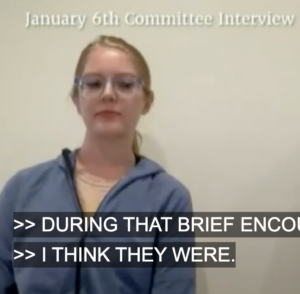
As Maggie Haberman noted days after the search, the FBI had reached out to Michael for an interview.
It’s highly likely that Michael either used or had access to the drawer in Trump’s office from which 144 items, for a total of 989 pages, were seized. All of those documents went through the privilege review and it’s likely that many of the 60-some potentially privileged documents were from that desk. Indeed, these two documents, treated as potentially privileged, are most likely from a desk that was in active use.

These two documents are ones over which Trump is making some of the most remarkable claims. According to an October 20 filing, DOJ had agreed with Trump that these were personal documents (even in spite of their reference to “POTUS), yet Trump was claiming Executive Privilege over them.

Given the Presidential Record Act rules that if a document has been shown to the President, it becomes a Presidential Record, by far the best explanation for the agreement these are personal documents over which Trump is trying to claim privilege — as I noted here — is that they reflect the Mar-a-Lago office running like his White House office used to, with his assistant, Molly, providing meeting requests and questions for Trump to review. The reference to “POTUS” cannot be a reflection of his position if and when he did review them, because if he were still POTUS, they would be Presidential Records. Rather, the moniker likely reflects that all the sycophants at Mar-a-Lago still call him POTUS.
Over the course of the privilege dispute, then, Trump provided compelling evidence that these two documents were created after he left office. He probably also confirmed that Molly Michael was the one accessing these documents.
Thanks Don!
That’s important for the document I’ve called a mini smoking gun: the document that includes a Secret document, a Confidential document, messages from a pollster, a religious leader, and a book author, as well as one page (SM_MAL_00001190) over which Trump is claiming attorney-client privilege.
One potentially privileged document that had been scanned was removed from the database (SM_MAL_00001185 to SM_MAL_00001195). That document – excluding the one potentially privileged page (SM_MAL_00001190) – is discussed in the next section about the Filter Materials Log. The potentially privileged page is the subject of a separate letter from the Filter Team to Your Honor, which is sent today.
[snip]
This document is a compilation that includes three documents that post-date Plaintiff’s term in office and two classified cover sheets, one SECRET and the other CONFIDENTIAL. Because Plaintiff can only have received the documents bearing classification markings in his capacity as President, the entire mixed document is a Presidential record.
Besides the classified cover sheets, which were inserted by the FBI in lieu of the actual documents, none of the remaining communications in the document are confidential presidential communications that might be subject to a claim of executive privilege. Three communications are from a book author, a religious leader, and a pollster. The first two cannot be characterized as presidential advisers and all three are either dated or by content occurred after Plaintiff’s administration ended. [my emphasis]
This document as a whole is the one other one that Trump is trying to withhold entirely under an Executive Privilege claim over what he says is a personal document.

This is obviously a document Trump would badly like to claw back from the government — and for good reason: it is evidence that he was accessing classified records in conjunction with his business after leaving the White House.
Note the government calls it a “compilation,” the same word included in the Reply brief. The government wants to show unclassified documents to witnesses to find out when they might have been compiled.
If I’m right that this document comes from the same drawer as the Molly’s Questions for POTUS Approval documents, then she is likely the witness who can say when it was compiled. She would be the witness who could explain why Trump integrated a Secret document into his ongoing personal business. She might even testify that she saw the entire compilation, including the page over which Trump is claiming privilege, which would vitiate that privilege claim.
If I’m right, then the government is probably pretty anxious to put Molly Michael in front of a grand jury with these unclassified documents. They just need the 11th Circuit to proclaim all these Trump claims bullshit, as they’re likely to do after next week’s Tuesday hearing.
This would be a priority for another reason.
If the government is going to charge Trump, they need to find documents that are sufficiently damning to persuade the jury (and the public) that what Trump did was corrupt, but not so sensitive that agencies would refuse to declassify the documents for trial. This document, along with the Roger Stone clemency, is the sweet spot: They both include a Secret document. They both were stored in a readily accessible desk drawer. And they both reflect more personal business.
Indeed, the other most heated fight over designations, after this compilation document, pertains to a series of other clemency grants. Trump is trying to claim that documents that — by definition — could only exist in the context of his role as the President, are personal.
Filter Log Document 8 (portion) (A-023 to A-024) and
Filter Log Document 10 (A-031 to A-032)
Filter Log Document 12 (portion) (A-034 to A-035)
Filter Log Document 13 (portion) (A-041 to A-042)
The four bullet-pointed commutation analyses are Presidential records because they relate to the President’s “Power to grant Reprieves and Pardons for Offences against the United States, except in Cases of Impeachment.” U.S. CONST. Art. II, § 2, cl. 1. The four analyses were received by Plaintiff in his capacity as the official with authority to grant reprieves and pardons, not in his personal capacity. Plaintiff relies on Judicial Watch to “deem” the Presidential records to be personal records, but the dicta in that non-binding district court decision provide no authority to automagically recharacterize documents that are “Presidential records” within the meaning of the Presidential Records Act, 44 U.S.C. § 2201(2). See ECF 173, at 4-6 (global issues brief).
The four commutation analyses cannot be withheld from the Executive Branch on a claim of executive privilege because, among other reasons, Plaintiff may not assert the Executive Branch’s privilege to withhold documents from itself. See ECF 173, at 12-13 (global issues brief).
These are parts of the clemency packages for Ted Suhl, Rod Blagojevich, what are probably two Border Patrol agents convicted for shooting a drug smuggler, Ignacio Ramos and Jose Compean, and Michael Behanna, a soldier courtmartialed for killing an Iraqi prisoner. While it’s certainly possible Trump may have had corrupt purpose to hide the internal deliberations over these pardons from prosecutors, meaning they’d be evidence of a crime — albeit a different crime — themselves, this fight may also be a proxy for a fight over the Stone clemency which, unlike these four documents, includes a document classified Secret.
Trump’s lawyers may have next to no experience on Espionage Act cases. But they’re not dummies. They can figure out which documents are most likely to get Trump charged. And the ones they’re fighting hardest to claw back are the clemency packages and the “compilation.”
In fact, they’ve just spent the last two months emphasizing to the government that they believe these are the most damning documents (at least thus far), going so far as confirming that several of them post-date the time when Trump (and maybe Molly Michael) would have legal access to classified documents.
When this Special Master process started, there was the possibility that Trump might confirm things that helped DOJ prosecute him, most notably by confirming the inventory (though DOJ has made another bid to get Dearie to force this issue or deem accuracy claims to be waived).
But they did get something: They got Trump to confirm certain details, including dates, about records that were likely in his desk drawer. Which means they’ve helped prepare DOJ to interview whoever had control of that desk drawer.

